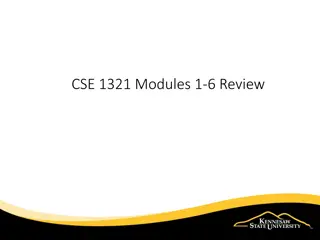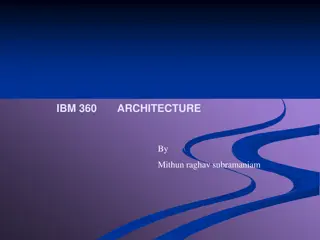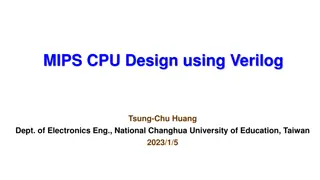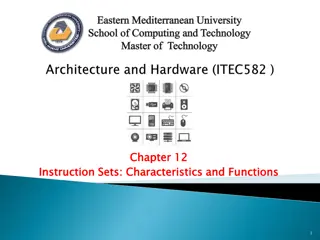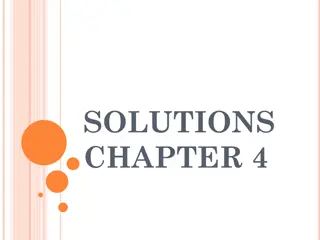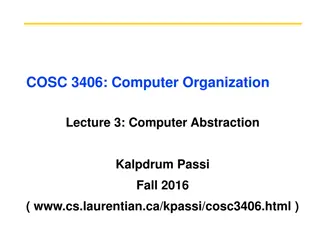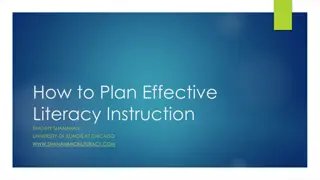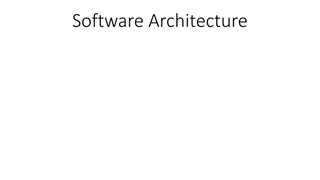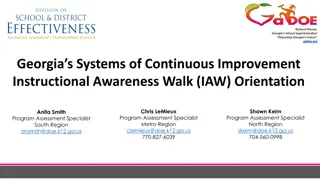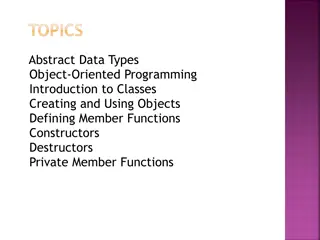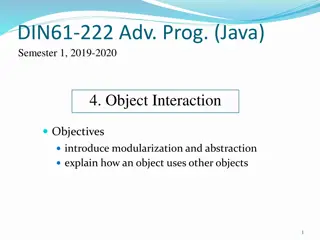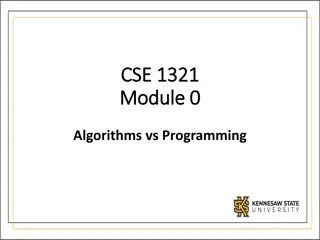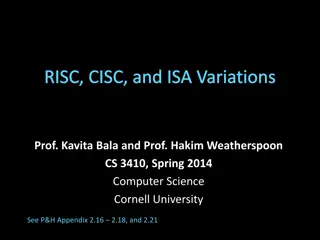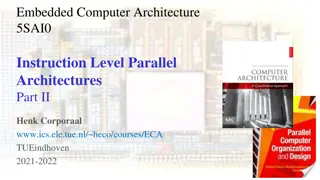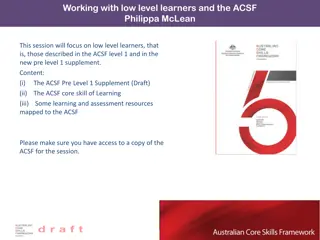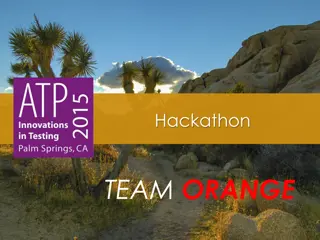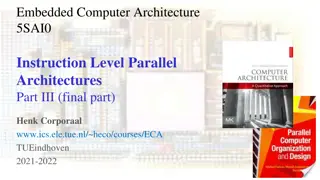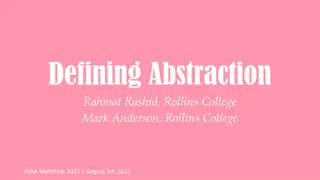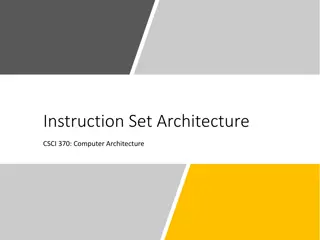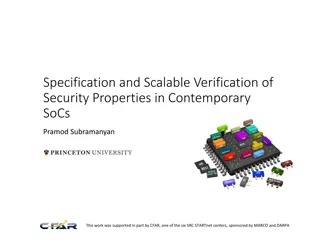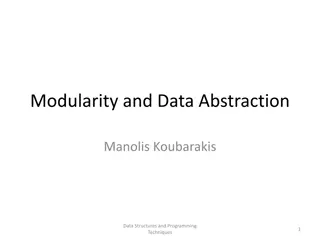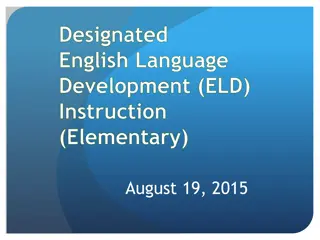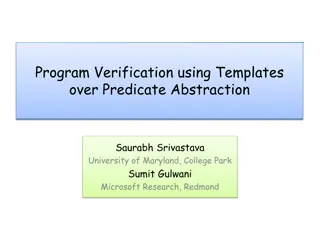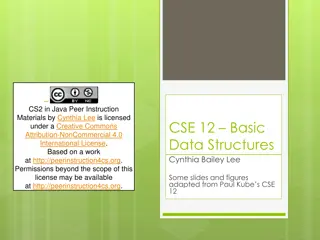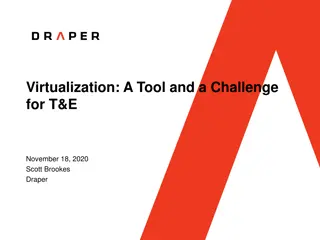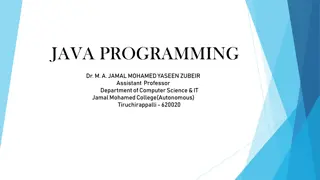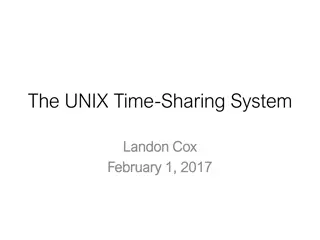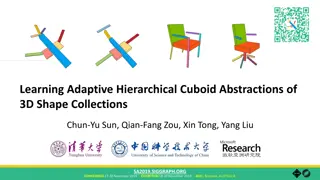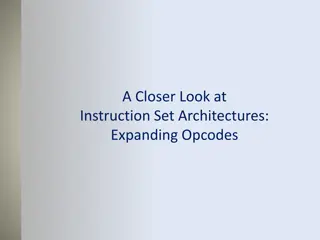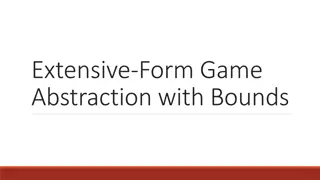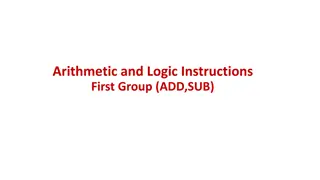Key Facts About Supplemental Instruction
Supplemental Instruction (SI) is student-led instruction for historically difficult courses, fostering collaborative learning and improving student performance.
2 views • 15 slides
Understanding Algorithms and Programming Fundamentals
Learn about algorithms, programming, and abstraction in computing. Explore the definition and properties of algorithms, the relationship between algorithms and programming, and the concept of abstraction. Discover how algorithms are like recipes and how abstraction simplifies complex tasks in comput
1 views • 17 slides
Network Function Abstraction A delicate question of (CPU) affinity?
Exploring the delicate balance of CPU affinity in network function abstraction, including challenges, benefits, and solutions like CPU pinning for network workloads. Learn about the impact on performance and scalability, as well as the importance of proper configuration in virtual and physical envir
3 views • 40 slides
Understanding Algorithms and Abstraction Concepts in Programming
Exploring algorithms as logical steps to accomplish tasks and abstraction as a way to group concepts for clarity in programming. Dive into flowcharts for sorting algorithms, pseudocode skeletons, and code snippets in various languages like C#, Java, and C++. Learn about handling variables and user i
2 views • 48 slides
Evolution of IBM System/360 Architecture and Instruction Set Architectures
The IBM System/360 (S/360) mainframe computer system family, introduced in 1964, revolutionized computing by offering forward and backward compatibility, a unified instruction set architecture (ISA), and a balance between scientific and business efficiency. The critical elements of this architecture
1 views • 18 slides
MIPS CPU Design Using Verilog and Instruction Set Architecture Overview
Explore the world of MIPS CPU design using Verilog with a deep dive into Instruction Set Architecture (ISA), SPIM instruction formats, addressing modes, and more. Learn about the key components such as Program Counter (PC), Instruction Memory (IM), Register Files (RF), Arithmetic Logic Unit (ALU), D
1 views • 29 slides
Understanding Machine Instruction Sets in Computing
This material discusses the characteristics and functions of machine instruction sets in the context of computing technology. It covers essential elements of machine instructions, types of operands, and the operation of the processor. Topics include operation codes, operand references, and instructi
0 views • 57 slides
MIPS Single-cycle Datapath Analysis for Instruction SW
Examine the operation of the single-cycle datapath for a specific MIPS instruction "SW.R4,-100(R16)". This analysis covers the instruction word value, register numbers, control signals, and the logic diagram implementation. Dive into details like instruction word encoding, register file operations,
0 views • 55 slides
Understanding Computer Abstraction and Performance Metrics
Computer abstraction, instruction count, CPI, and performance metrics like clock cycles, CPU time, and program execution are crucial concepts in computer organization. Through examples and detailed explanations, this lecture explores how architecture, instruction sets, compilers, and algorithms impa
0 views • 27 slides
Maximizing Literacy Achievement: Effective Instruction Planning Strategies
Timothy Shanahan from the University of Illinois at Chicago discusses key considerations for planning effective literacy instruction, including scheduling, amount of instruction, content to be taught, and the timing of instruction. Shanahan emphasizes the importance of providing ample literacy instr
1 views • 19 slides
Understanding Software Architecture Patterns
Software architecture refers to the high-level structures of a system, including architectural patterns that provide reusable solutions to common problems. Architectural patterns like Layered, Client-server, and Master-slave help in breaking down large systems for better management and maintenance.
5 views • 33 slides
Comprehensive Overview of Georgia's School Improvement Systems
Richard Woods, Georgia's School Superintendent, leads the initiative to enhance Georgia's education system through the Systems of Continuous Improvement. The Instructional Awareness Walk (IAW) program offers support to schools in establishing effective instruction and a conducive learning environmen
0 views • 17 slides
Computational Thinking, Algorithms & Programming Overview
This unit covers key concepts in computational thinking, including decomposition, abstraction, and algorithmic thinking. Decomposition involves breaking down complex problems, abstraction focuses on identifying essential elements, and algorithmic thinking is about defining clear instructions to solv
1 views • 5 slides
Introduction to Object-Oriented Programming and Data Abstraction
Introduction to object-oriented programming concepts including classes, objects, member functions, constructors, destructors, and abstract data types. Exploring the principles of abstraction in software development, passing objects to functions, and understanding the limitations of procedural progra
0 views • 47 slides
Understanding Modularization and Abstraction in Object-Oriented Programming
Modularization in programming involves breaking down complex problems into simpler sub-parts, while abstraction allows combining low-level details into higher levels. By using modules and abstract classes, software development becomes more manageable and efficient, especially in object-oriented prog
0 views • 39 slides
Formal Verification and Automata Abstraction in Esterel
This content delves into the applications of formal verification and automata abstraction in Esterel, focusing on techniques such as verification by abstraction of automata, boolean verification using BDDs, bounded model checking in SAT/SMT, and more. The work of Gérard Berry at the Collège de Fra
0 views • 38 slides
Understanding Algorithms and Programming: A Visual Introduction
Explore the fundamental concepts of algorithms and programming through visual representations and practical examples. Learn about algorithmic thinking, abstraction, recipe-like algorithms, and the importance of logical steps in accomplishing tasks. Discover how algorithms encapsulate data and instru
1 views • 17 slides
Satisfiability Modulo Abstraction for Separation Logic with Linked Lists
This study explores the application of satisfiability modulo abstraction in separation logic with linked lists. It presents a technique using abstract interpretation concepts to handle separation logic formulas beyond previous methods, specifically focusing on over-approximating heaps that satisfy t
0 views • 41 slides
Analysis of Data Manager Survey Results in VQI Abstraction
Survey results gathered from 942 notified Data Manager users in VQI abstraction revealed insights on responsibilities, experience levels, backgrounds, and facility types. Responses indicate varying levels of involvement with data collection, team size, and number of facilities managed, providing val
0 views • 27 slides
Variations in Computer Architectures: RISC, CISC, and ISA Explained
Delve into the realm of computer architectures with a detailed exploration of Reduced Instruction Set Computing (RISC), Complex Instruction Set Computing (CISC), and Instruction Set Architecture (ISA) variations explained by Prof. Kavita Bala and Prof. Hakim Weatherspoon at Cornell University. Explo
0 views • 55 slides
Exploring Instruction Level Parallel Architectures in Embedded Computer Architecture
Delve into the intricacies of Instruction Level Parallel Architectures, including topics such as Out-Of-Order execution, Hardware speculation, Branch prediction, and more. Understand the concept of Speculation in Hardware-based execution and the role of Reorder Buffer in managing instruction results
0 views • 51 slides
Understanding Factors Influencing Black STEM Aspirants in Higher Education
The research focuses on investigating factors predictive of Black students' participation in STEM programs, particularly examining supplemental instruction and faculty mentorship. Supplemental instruction targets at-risk courses, while faculty mentoring provides intentional support and improves acad
0 views • 22 slides
Supporting Low-Level Learners with ACSF: A Focus on Pre-Level 1 Skills
This session delves into assisting low-level learners based on the ACSF level 1 and pre-level 1 supplement. It covers the ACSF Pre-Level 1 Supplement, core learning skills, and resources aligned with the ACSF. Learners at this level show readiness for learning but may need varying levels of support
0 views • 20 slides
Certified Professional in Online Instruction: Promoting Quality and Credibility in Distance Education
International Certification Board of Online Instruction (ICBOI) offers the Certified Professional in Online Instruction (CPOI) program to assess knowledge and skills in technology and pedagogy. This certification aims to enhance the quality and effectiveness of online instruction, helping schools ga
0 views • 9 slides
Embedded Computer Architecture - Instruction Level Parallel Architectures Overview
This material provides an in-depth look into Instruction Level Parallel (ILP) architectures, covering topics such as hazards, out-of-order execution, branch prediction, and multiple issue architectures. It compares Single-Issue RISC with Superscalar and VLIW architectures, discussing their differenc
0 views • 49 slides
Exploring Abstraction in Mathematics: Insights from MAA MathFest 2022
Delve into the concept of abstraction with a focus on diverse perspectives, historical influences, pedagogical approaches, and the process of abstraction itself as discussed at MAA MathFest 2022. Engage with enlightening comparisons and references shedding light on this fundamental mathematical prin
0 views • 7 slides
Understanding Portraits: Realism, Abstraction, and Representation
Delve into the world of portraiture with a focus on realism and abstraction, exploring how artists like Cézanne, Vermeer, and Picasso depict their subjects. Learn the significance of portraits, the difference between realistic and abstract art, and the impact of color on portraying emotions and pro
0 views • 7 slides
Understanding Y86-64 Instruction Set Architecture
Explore the Y86-64 instruction set architecture in computer architecture, focusing on processor state, memory, instruction encoding, and operation. Learn about the different instruction formats, registers, condition codes, and how instructions access and modify program state.
0 views • 36 slides
Scalable Verification of Security Properties in SoCs
Contemporary SoCs pose challenges in verifying security properties due to the combination of hardware and firmware components. This work discusses the complexities of verifying SoCs, the construction of Instruction-Level Abstraction (ILA), and the synthesis of ILA using advanced techniques. Security
0 views • 9 slides
Understanding Modularity and Data Abstraction in Programming
Learn about the importance of procedural abstraction, information hiding, modules, and abstract datatypes in programming. Discover how these concepts help in structuring large programs, improving maintainability, and enhancing data organization and operation control.
0 views • 56 slides
Effective English Language Development (ELD) Instruction Strategies
Key areas of focus for effective English Language Development (ELD) instruction at the elementary level include providing daily rigorous instruction, developing language objectives for student discourse and academic vocabulary, and using formative assessments to guide teaching. Designated ELD time s
0 views • 11 slides
Program Verification Using Templates Over Predicate Abstraction
This research explores a technique that allows for inferring invariants with arbitrary quantification and boolean structure, improving the state-of-the-art in program verification. It can infer weakest preconditions, helping with debugging and analysis by discovering worst-case inputs and missing pr
0 views • 32 slides
Peer Instruction in Java: Enhancing Learning Experience
Explore the world of data structures through peer instruction in Java with Cynthia Lee. This approach involves interactive group discussions, problem-solving, and hands-on activities to deepen understanding of key concepts. The course covers topics such as ADTs, APIs, algorithm analysis, object-orie
0 views • 23 slides
Understanding Virtualization: Hardware Abstraction and Hypervisor Concepts
Dive into the world of virtualization with a focus on hardware abstraction and hypervisor technology. Explore the definitions and examples of hardware virtualization, hypervisors, and hardware abstraction, shedding light on how they enable multiple operating systems to coexist on a single physical m
0 views • 21 slides
Fundamentals of Object-Oriented Programming in Java
Object-Oriented Programming (OOP) is a methodology that simplifies software development by using classes and objects. This paradigm includes concepts like Object, Class, Inheritance, Polymorphism, Abstraction, and Encapsulation. Other terms used in OOP design include Coupling, Cohesion, Association,
0 views • 54 slides
Evolution of Data Abstraction in Operating Systems
Explore the evolution of central data abstraction in operating systems from the complexity of Multics to the simplicity and elegance of Unix. Discover how files are managed in Unix, the tradeoffs in data-sharing methods, and the impacts on efficiency and protection.
0 views • 41 slides
Innovative 3D Shape Abstraction Research at SIGGRAPH 2019
Explore the cutting-edge research on adaptive hierarchical cuboid abstractions and 3D shape structures presented at SIGGRAPH 2019. The goal is to construct a good 3D abstraction for shapes, focusing on compactness, expressiveness, adaptiveness, and consistency.
0 views • 56 slides
Understanding Expanding Opcodes in Instruction Set Architectures
Exploring the concept of expanding opcodes in instruction set architectures, this lecture delves into how varying the number of operands affects instruction length and efficiency. By utilizing expanding opcodes, it is possible to accommodate different operand requirements and optimize instruction en
1 views • 27 slides
Understanding Game Abstraction and Equilibrium
Extensive-Form Game Abstraction with Bounds delves into the complexities of game abstraction, exploring theoretical guarantees, algorithmic challenges, and equilibrium-finding processes. The difficulty of game abstraction is examined, highlighting issues such as pathologies and the struggle to optim
0 views • 22 slides
Arithmetic and Logic Instructions: ADD Instruction Overview
The ADD instruction is part of the Arithmetic and Logic Instructions First Group and is used to add a number from a source to a destination and store the result in the specified destination. The instruction affects flags like AF, CF, OF, SF, and ZF. It can operate with immediate numbers, registers,
0 views • 24 slides



